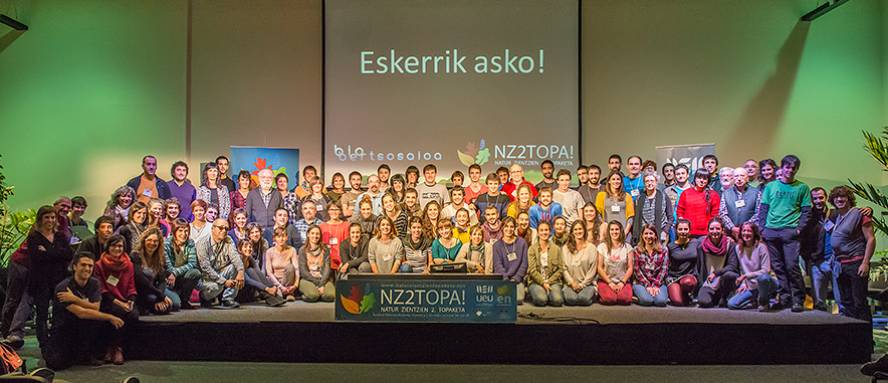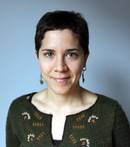NZ2Top! Naturaz eta euskaraz, elkarrekin Topa!

On Saturday morning, after the welcoming ceremony, we immediately began to reflect on energy consumption. The socio-economic model of today's society is causing the loss of conventional energy sources, which leads us directly to the energy crisis we hear so much. Faced with this, the use of renewable energies is proposed as an alternative, with an inexhaustible idea. But what is it that they really offer us? Our three speakers tried to answer doubts and questions.
Ortzi Akizu told us about the imbalance between countries of the north and south, the ecological debt, the Peak oils and the need for the transition of the energy model, with practical examples. On the other hand, speakers María Dolores Martínez and Jon Toña presented two alternatives to the energy model underway in the Basque Country: GoiEner cooperative and the Aramaio biomass project, respectively. Both aim to curb the commodification of energy through the execution of projects of local alternatives.
Practical examples of nature management: one of the novelties of this year
One of the objectives of NZ2Topa! It has been to make a more participatory and dynamic meeting: that the participants are the true protagonists. The aim of the session was to analyze cases related to the conservation of nature, in order to debate among all and seek solutions. To do this, we proposed four topics of discussion in small groups led by an expert: ecological debt (with expert Leire Urkidi), the management of threatened species in anthropized areas (with Ion Garin and Aitor Loza), ecosystem restoration (with Joxerra Diez) and rural landscape management (with Miren Askasibar). He highlighted the willingness of participants to take the word. The result was very positive and enriching.
We end on Saturday morning with the main conclusions in the presence of all participants.
Round table: “Science in the media, the media in science”
The bridges Urko Aristi, Miren Bego Urrutia, Jakoba Errekondo and Bego were invited to a round table where the atmosphere is heated after lunch. On the NZ2Topa website! the moderator Antton Alberdi offered a round table with the results of the questionnaire launched a week and a half before the meeting and launched several questions.
At first, it was a question of talking about the role of science in the media and what the media has in science, but as the round table progressed, the two ideas were mixing. The idea that science occupies too small a space in the media was imposed on the questionnaire and the members of the table joined this idea. Bego and Urko related it to the reduced audience of scientific issues in the media. It seems evident that the times of Peio Zabala attract more attention. From time to beliefs… Jakoba Errekondo argued that the concept of “science” can be seen from different perspectives. To clarify the idea of science, we had the opportunity to hear from the public many opinions.
We cannot say that we came to a common conclusion, but some things were clear. One, we need a scientist who generates a vision like Peio Zabala to transfer science to Basque society in a direct but attractive way through the media. Two, scientists must make a greater effort to socialize their subjects, for which it will be necessary to regain confidence in journalists. And three, it is up to the media to give more force to science-based content, so that the public can distinguish between what is the scientific base and what is not.
Poster and Project Offers Session
As a colophon in the afternoon of Saturday, we leave the seats and launch the second novelty of this year, giving the opportunity to posters to present their work and/or offers of projects. During the whole weekend all the participants were hung on the panels so that they could read the posters. However, on Saturday afternoon, participants made a different tour based on their interest, listening to the explanations of their authors and addressing very diverse topics (from glacial setbacks to biochemical and histological studies of marine polychaetes). This year we deliver the Elhuyar prize to the best poster and the UEU-EuskalNatura award to the best student poster.
Soil as social support
On Sunday morning, the road began on the eve. We begin the day chatting with three speakers about the importance of the soil situation.
Biologist Lur Epelde stressed the importance of soil as a human and launched the threats he suffers. We do not know the current situation of soil in Euskal Herria, but it made it clear that it is important to keep it in a healthy situation. Garikoitz Ríos highlighted the importance of the state of the soil, setting as an example the development of txakoli and especially of the winery Itsasmendi. The last speaker was Haritz Azurmendi, a member of the association Ximaurpila. The association is based on the promotion of organic agriculture, experimentation, advice and technical assistance towards food subsistence. To do this, they try to combine traditional knowledge and science.
PaleoUEU: “Old, yesterday… Young people, past, past…”
We also invite three people who were part of the creation of the UEU to make known the evolution and experiences of the UEU during these long years, and especially of the UEU Department of Natural Sciences. The paleoJesus Mari Txurruka, Martxel Aizpurua and Kepa Altonaga told us everything. What started in black and white, they finished in color.
BioBertso saioa
We invite the bertsolaris Xabier Amuriza, Onintza Enbeita and Julio Soto and the natural science speaker Uxue Alberdi to give a humorous point to NZ2Topa! It was clear to us that nature has an excuse to smile.
A greeting, until the next!
We finish the meeting in a pleasant environment and surrounded by naturalists, as is customary in Euskal Herria, around the table. Through a good meal, participants were able to continue with desire and relate to new people on the topics studied and reflected during the weekend.
To finalize the analysis of a long weekend, you can not finish in the same meeting and without thanking all the people who have participated in the development of it. Another year we have fulfilled the goal of being a meeting point and excuse for nature lovers.
To nature, to science and to the Basque, together Topa!






